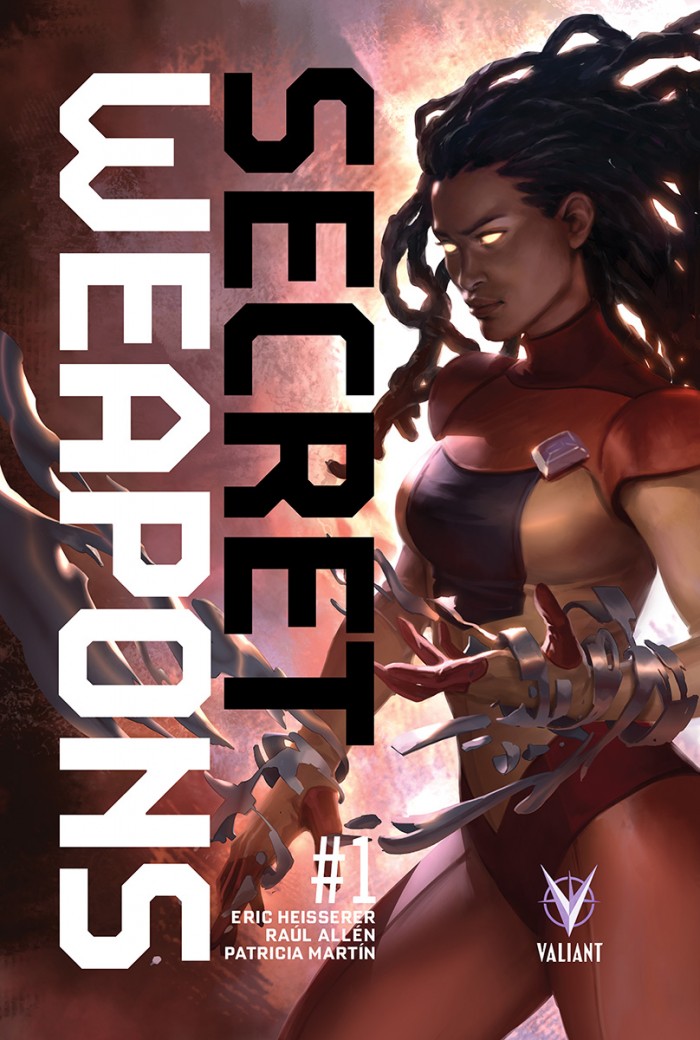'Arrival' Writer Eric Heisserer On Building The Valiant Cinematic Universe And His New Comic Series [Interview]
Screenwriter Eric Heisserer wrote Arrival, /Film's favorite movie of 2016. He's now an Oscar nominee and could very easily take home his industry's highest honor in a few days. But when I spoke with Heisserer, less than a week before the big ceremony, we didn't talk about that acclaimed science fiction masterpiece. After all, he's busy building a superhero movie universe at the moment.
The average moviegoer probably isn't familiar with Valiant Comics and their vast cast of heroes and villains, but Sony is hoping they'll want to get acquainted. Films based on Harbinger (about a team of young heroes with incredible abilities) and Bloodshot (about a tormented soldier enhanced with tech that makes him unstoppable) are in the works and Heisserer is writing the screenplays. More than that, Heisserer has gone all in on the Valiant universe: his new Valiant comic series, Secret Weapons, debuts this summer.
So, how do you build a superhero movie universe in a crowded field? And how do you transition from writing movies to writing comic books? All of this (and some awesome new art from Secret Weapons) can be found in the interview below.
Before we begin, here's what you need to know: Secret Weapons follows the Valiant superhero Livewire as she stumbles across a group of young "psiots" (super-powered individuals) with seemingly useless powers. One can talk to birds. Another can make objects glow. But Livewire, one of Valiant's more hopeful and optimistic characters, doesn't see failure. She sees...wait for it...a group of secret weapons. The series is a collaboration between Heisserer, artist Raul Allen, and colorist Patricia Martin, with the first issue arriving in June. You can check out four finished pages from the first issue, as well as covers by Allen and Jelena Kevic-Djurdjevic, as you read our conversation.
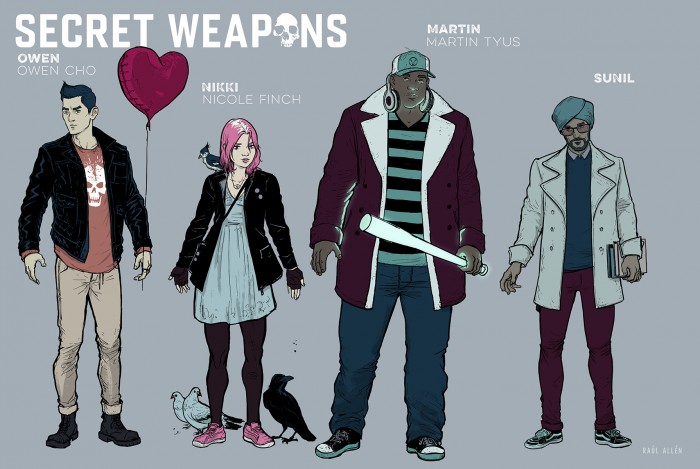 First of all, congratulations on your Oscar nomination. We're big fans of Arrival at /Film.
First of all, congratulations on your Oscar nomination. We're big fans of Arrival at /Film.
Thank you much.
I was wondering about the key differences in adapting a short story for the screen and then adapting a comic book. One is all about expansion and the other is all about picking and choosing from a wider universe. How do you approach that?
They each have their strengths and weaknesses in terms of adaptation. The short story has a beginning, middle and end, so you get a sense of the full feature with that. With a comic book, they're all sort of integrated, longer stories that sometimes have smaller arcs within them. Often, you have to find if there's either a way to rewire a comic story into a feature length film or if you need to find another story you can tell from these characters that will still remain true to them but ends up being a new plot.
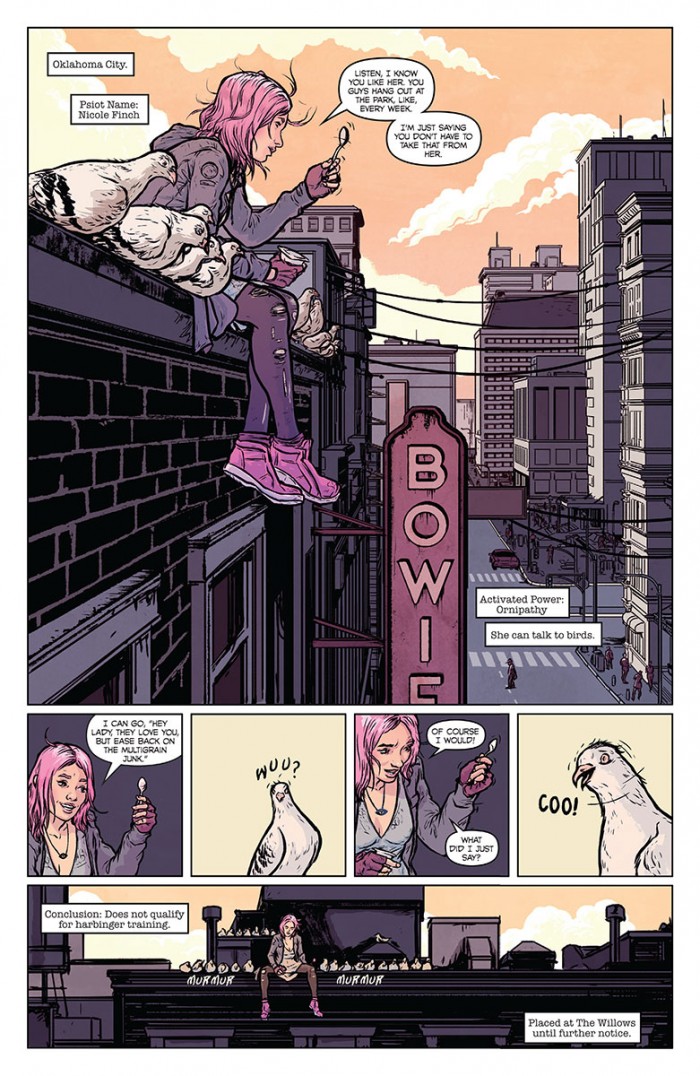 How does screenwriting prepare you for writing a comic? Is your dynamic with Raul Allen similar to other creative collaborations you've had in the film world?
How does screenwriting prepare you for writing a comic? Is your dynamic with Raul Allen similar to other creative collaborations you've had in the film world?
I'd say that writing comics makes you keenly aware of directing, because you have to figure out the visuals, where the "camera" goes and how many panels you can cram into something and how much visual information you want on the page. The nice thing about working with someone like Raul Allen is that it's like writing a movie for Denis Villeneuve. You're writing for an artist who is at the top of their game. It means that I don't have to worry so much about what works in a panel or how many frames are crammed onto to page or when to breathe. He knows all of these things. I wrote the first issue's script as specifically as possible because I didn't know I would get Raul at that time. You do your best to be very clear in the script, early on. The later scripts were very much "Here's what I loved about Wrath of the Eternal Warrior, Raul, can you do something here?" [Laughs]
I've read a lot of screenplays but only a few comic book scripts. How rigid are the rules compared to making movies?
I had come from writing a couple of books for Dark Horse where I got very specific. I found artists on both of those titles who liked the detailed direction. I didn't go as far as [Watchmen writer] Alan Moore, who gets incredibly specific with his details on each comic page, to the point where you sometimes see two or three script pages for one comic page. I did get specific about panel layout and where we're looking, what's our POV, how much do we want to communicate within the page. I guess that's where I came from. I came from that idea. If this were analogous to a script for a film, I'd say I did a lot of directing on the page and talking about camera angles and movements.
With Raul, I don't have to worry about that. I have much more of a sure hand and can talk about how I want the reader to feel as they read and watch the page. It's a different approach. It's more holistic and I think it's going to just garner some magical results. All of the stuff I've seen from Raul has me just floored. I can't wait for issues two and three to drop.
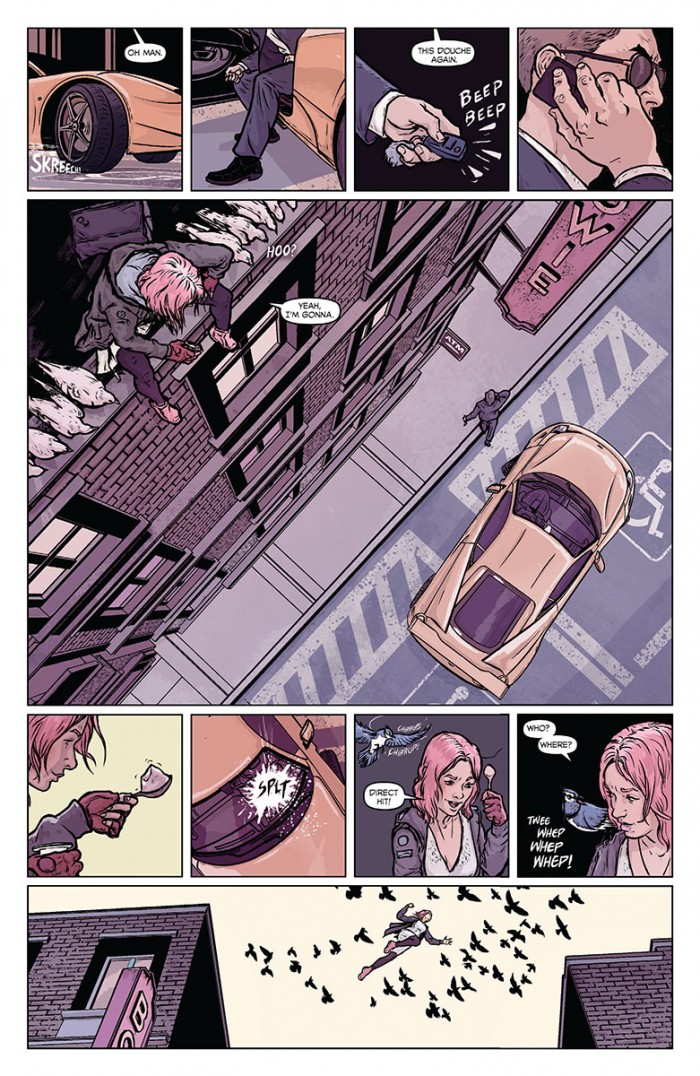 Your average person isn't as familiar with the Valiant characters as they are with the likes of Superman and Spider-Man. When you're writing these characters for comics or film, does the lack of baggage feel like a blessing or a curse?
Your average person isn't as familiar with the Valiant characters as they are with the likes of Superman and Spider-Man. When you're writing these characters for comics or film, does the lack of baggage feel like a blessing or a curse?
I see it entirely as a blessing because they don't come with any baggage, whether it's good or bad. The average viewer, I would say, doesn't have any preconceived notions of what these characters should be. For those who have been Valiant fans for a long while, it is my greatest hope that they find the essence of the character they have always loved in the depiction of those characters. It allows me to introduce them and develop them in a way that feels authentic and organic to what the story is. They'll be set apart from a Marvel or DC character. These titles live in a world that carved out another corner of the comic book film genre that has been unexplored.
I was reading a lot of Valiant over the past week and I was bowled over by Bloodshot Reborn, which takes a character who could be very silly and makes him so relatable and human.
Yeah.
As someone who works in a lot of genre stuff, how do you approach a character that audiences could dismiss and say "No, this is why you should take him seriously"?
I'm grateful in part to the people like you out there, who can go in and give everything a chance. Hopefully, if we do everything right, the casual viewer, who might see a trailer or poster or something and make a snag judgment based on that...if they see enough advance buzz from tastemakers out there who say "This is something very different and unique and you should take a look at it," then I think we have a chance. And if it doesn't resonate with people like you out there, it's because we didn't differentiate ourselves enough or we leaned into a trope or some cliche that the titles themselves have a done an amazing job of avoiding. Hopefully, that never happens.
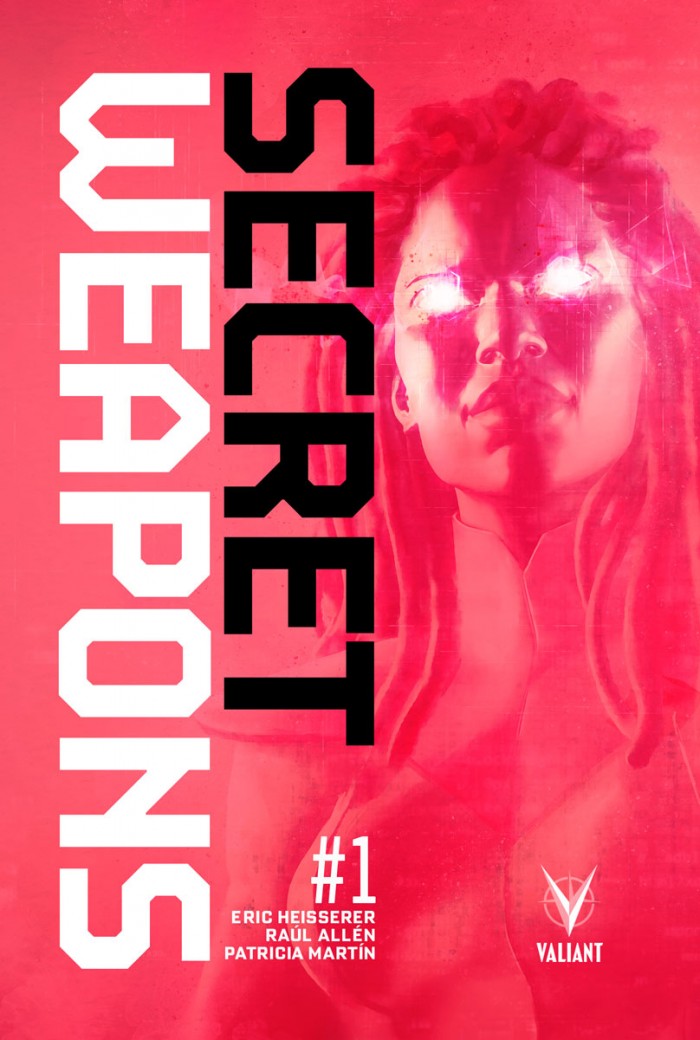 So I want to talk about Secret Weapons because that's the reason you're on the phone with me...
So I want to talk about Secret Weapons because that's the reason you're on the phone with me...
[Laughs] Yeah!
In the initial announcement for the series, you talked about how you were writing the character of Livewire [a superhero who can control machines with her mind] in your Valiant film projects and you fell in love with her. She's been an ensemble player in most modern Valiant stories, so what about her appealed to you? Why put her center stage?
Livewire, to me, has such a big heart. She's such an amazing character due to her moral compass. She grew up disadvantaged. She grew up in bad and dire circumstances. As Wentworth Miller said, "I grew up in survival mode." I feel like that really says a lot about Livewire before she was discovered by Harada [the founder of the Harbinger Foundation within the Valiant universe]. What Harada taught her was a sense of values and principles, all with a deep ethical and moral code to them that allowed Livewire to build a life and create a worldview that saw the best in people, that saw the best in everyone. The risk that always happens when a character like that is disillusioned and discovers that the person who taught her all of those values is corrupt themselves and has become misguided and has gone to a darker side of things...
Typically, the student's life is broken open and they are lost and confused in their own ways because they question everything they've been taught. But Livewire has always held on to what is right and what is human and what is the good thing to do. How to be a good person. That's what I love about her. That's why I was so excited to write more about her.
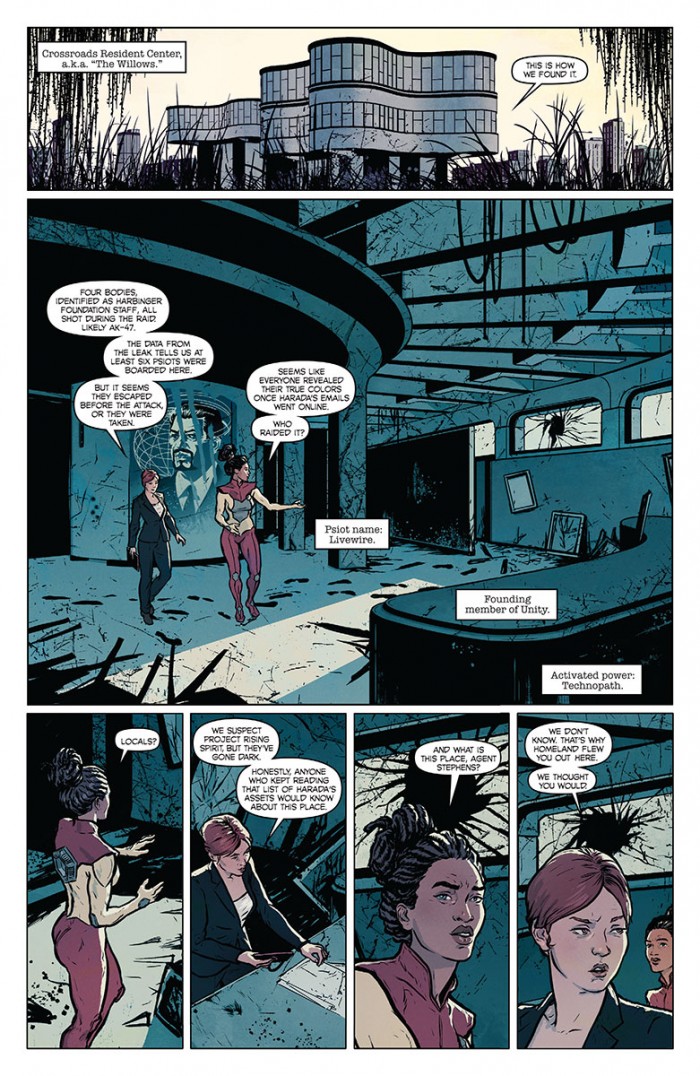 Heroes who are purely good and noble are sometimes lacking in the modern comic book and comic book movie landscape.
Heroes who are purely good and noble are sometimes lacking in the modern comic book and comic book movie landscape.
Yeah, we love the antihero and we love the dark, brooding types, but it's so rare that we see someone who is naturally trying to be good to everybody. That can come across as flat, if you don't realize how hard it is to be that. You have to lean into that.
I'm going to paraphrase this...I'm pretty sure I've heard it attributed to [comic writer] Mark Waid, but it's about writing every single issue of a comic as if it was the first comic book for someone in the world.
Ah, yeah.
Do you think about that when you write comics? With something like Secret Weapons, do you concentrate on pleasing Valiant fans or trying to keep things accessible for newcomers?
I don't often think about it, but I do believe that I end up with material that can work for someone who brand new, not just to Valiant, but to comic books in general. A lot of that has to do with my unbridled passion for these characters and this world. I feel like I end up pitching everybody in my circle of friends about whatever is going on in the comic as if it was a book that I just picked up and began reading. My friends are tired of hearing me talk about Secret Weapons now. [Laughs] My hope is that some of that is contagious and you can find it on the page as well.
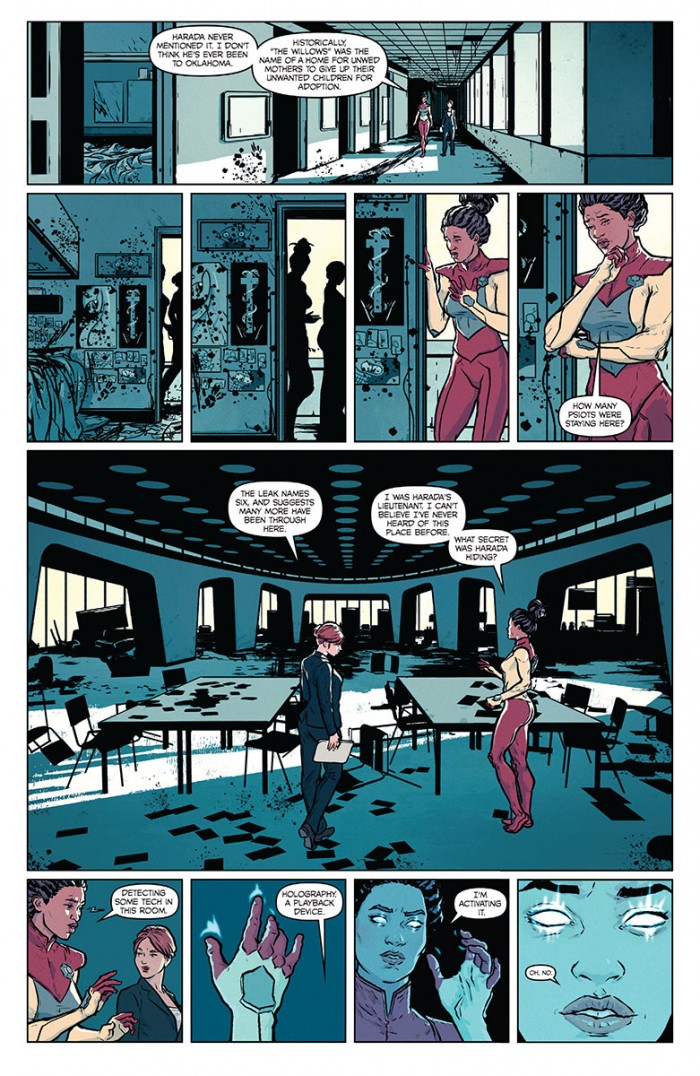 You fell in love with Livewire while writing her in the Harbinger screenplay. What other Valiant characters would you be excited to see in a movie? Or to write in a movie?
You fell in love with Livewire while writing her in the Harbinger screenplay. What other Valiant characters would you be excited to see in a movie? Or to write in a movie?
I'm actually really excited about Bloodshot. I've done some work...in fact, I've just turned in a draft with a director attached and I'm very excited to see if that moves the needle at Sony. But he's such a fascinating character in his own right. From Harbinger, Faith is such a remarkable and fresh character. I had such fun writing her. If I ever felt a little inundated or overwhelmed by the work I had to do on Harbinger, I'd just pick up an issue of Jody Houser's Faith title and I'd read some pages and get excited again.
When you have a studio like Sony interested in building a Valiant cinematic universe, what are the pitfalls you're looking out for? After all, some comic book movie shared universes have worked out great and others have stumbled.
The biggest hurdle is to make sure you're creating a world and you're creating characters that feel distinctly different from a Marvel movie or a DC movie. They have to occupy their own space. They can't feel like a carbon copy of something that has come before them. The good news is that all of these characters are different in their own rights. You just have to find that and embrace it and make sure that you're doing something that looks and feels new. Beyond that, I don't worry too much about shared universes or setting up sequels or anything like that. The goal with each of these films is to make great stories in their own right that stand on their own with a beginning, middle, or end. If we are so privileged and honored as to come back and revisit them later, assuming the public likes them, then great. We'll find a way to make another story. At this point in time, it's just about doing justice to these characters in the time we have.
